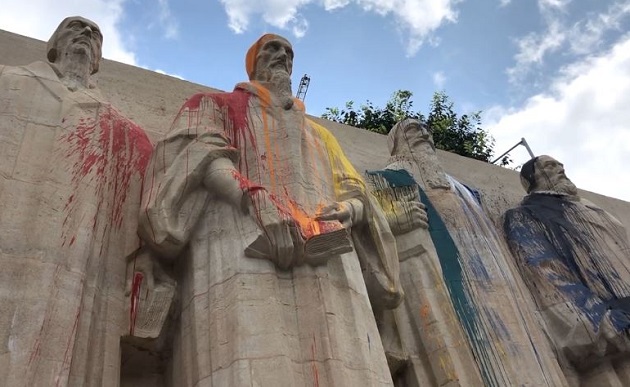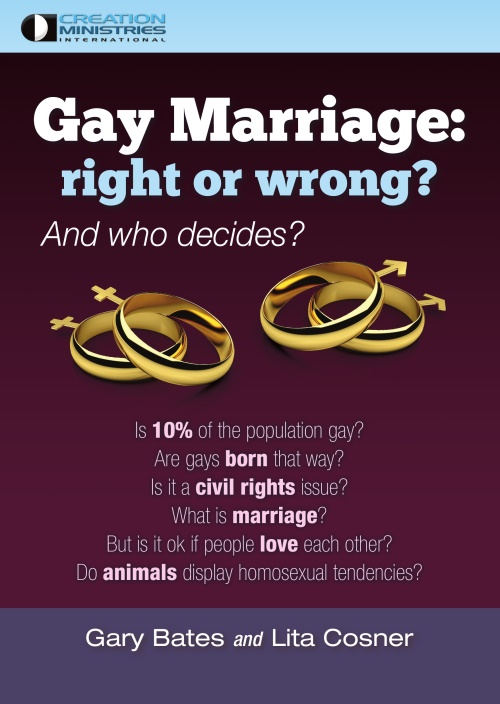Reformation wall vandalized yet again
The spiritual thermometer of our culture’s departure from the foundation of Genesis

Credit: LemanBleu.ch
On 15 July 2019, passers-by discovered that rainbow-colored paint adorned the heads of the statues of four figures of the Protestant Reformation. These statues represent John Calvin, Guillaume Farel, Théodore de Bèze (aka Beza), and John Knox (figure 1) on the Reformation Wall in Geneva, Switzerland. Most likely, an LGBT group had vandalized the statues because of the rainbow coloring of the paint, but no-one yet has come forth to claim responsibility for the act. This is not the first time that the monument has been defaced. For example, in March 2019, a feminist group sprayed graffiti across the monument, saying “Where are the women?”1 But this act of vandalization is not an isolated event—it is yet another case of a Christian monument being defaced as a symbolic token of the rejection of Christianity in modern culture.
Vandalization by itself might not be such a big issue, but this is part of the bigger picture of the worldwide rejection of Christianity. This is often manifested for example in persecution against Christians in countries in the Middle East, Nigeria, India, China and North Korea. According to an ex-FBI special agent, persecution against Christians is on the increase.2 The international Christian organization, Release International, forecasted that persecution of Christians will rise worldwide in 2019.3 According to a Pew Research poll, Christians face significant levels of persecution in 144 countries. Every month, 345 Christians are murdered for their faith and 105 churches, and monuments or buildings are also violated.4
The vandalization of the statues of the Reformers are a thermometer of the spiritual condition of our wider society. It is obvious that the LGBT group in question rejects the biblical concept of marriage between one man and one woman. This stems from the rejection of the Christian worldview, which is based on the book of Genesis. Therefore, this LGBT group expresses their rejection of God’s creation ordinances by defacing the monuments of some of those men who fought so hard to establish the ultimate authority of the Bible. Today’s society has so departed from biblical authority that it is now considered normal to be ‘gay’ or ‘transgender’. Many young people don’t even think that homosexuality is wrong.
The rainbow's association with the LGBT movement rather than God's covenant with Noah is evidence of the waning influence of Christianity. There are Christians who are calling for us to reclaim the rainbow from the LGBT community as a sign of God’s grace. This is well overdue. However, we must also stress that God gave mankind the rainbow as a covenant after He had judged the world by the Flood, as we read in 2 Peter 2:5.
“ … if he did not spare the ancient world, but preserved Noah, a herald of righteousness, with seven others, when he brought a flood upon the world of the ungodly.” [emphasis added]
But God’s judgment was not only on the pre-flood world. 2 Peter 2 likened God’s watery judgment during Noah’s day with His fiery judgment of Sodom and Gomorrah. Jude 1:7 tells us:
“ … as Sodom and Gomorrah and the towns around them indulged in sexual immorality and pursued unnatural desire in the same way as these, are exhibited as an example by undergoing the punishment of eternal fire.” [emphasis added]
Therefore, it is quite possible that atheists and the LGBT community might want to erase all traces of the memory of the worldwide Flood, which stands as a memorial condemning their unrighteous acts. They understand that the Bible warns of another future global judgment on all who refuse to repent from their sins. In 1 Corinthians 6:9–11 (Lexham English Bible), we are warned,
“Or do you not know that the unrighteous will not inherit the kingdom of God? Do not be deceived: neither the sexually immoral, nor idolaters, nor adulterers, nor men who practice homosexuality, nor thieves, nor the greedy, nor drunkards, nor revilers, nor swindlers will inherit the kingdom of God. And such were some of you. But you were washed, you were sanctified, you were justified in the name of the Lord Jesus Christ and by the Spirit of our God.” [emphasis added]
This passage calls for repentance and a turning away from these sins. Some English Bibles combine the Greek word arsenokoitēs (ἀρσενοκοίτης) with a second word in this verse malakos (μαλακός), to get the word, ‘homosexuality’. But the Greek actually use two words, not one—arsenokoitēs and malakos, and both words have specific meaning. The first word is arsenokoitēs, a compound word describing “a man who has sexual relations with another man”.5 This same word also appears in 1 Timothy 1:10.6 In addition, this is the same word is also used in Leviticus 18:22 and 20:11–15 in the Septuagint (Greek Old Testament), meaning that both the Old and New Testament condemn homosexuality. The second word, malakos, with the primary meaning of ‘soft‘, refers to the passive partner in a same-sex relationship, one who is effeminate or soft.7
It is no wonder that Christianity is under so much attack today, because of its emphasis on the necessity of repentance (Acts 17:30–31). However, another factor is that there is no other time in history than the present when we have so much evidence for the truthfulness and the historical accuracy of the Bible. The ungodly know that they are sinners, and they also know that God exists, but instead of glorifying Him, they repress God’s truth, including any reminder of God’s judgment. Romans 1:18–19 says “Therefore, ‘For the wrath of God is revealed from heaven against all ungodliness and unrighteousness of men, who by their unrighteousness suppress the truth. For what can be known about God is plain to them, because God has shown it to them.’”
After 40 years of scientific creation research, our website has more than 11,000 articles which attest to this. We would like to encourage our readers to take heart and stand firm on God’s Word in the midst of a hostile culture. Truth is on our side. Trust in God, and trust in His Word.
References and notes
- Evangelical Focus, Reformation Wall in Geneva vandalised, evangelicalfocus.com/cities/4602/Vandalism_against_the_wall_of_the_Reformers_in_Geneva, accessed 16 July, 2019. Return to text.
- Parke, C., Terrorist attacks on Christians ‘happening more and more’: ex-FBI special agent, foxnews.com/world/sri-lanka-church-attacks-christians, accessed 16 July, 2019. Return to text.
- Parke, C. Christian persecution set to rise ‘sharply’ in 2019, group warns, foxnews.com/world/christian-group-warns-of-sharply-rising-persecution-in-these-countries-in-2019, accessed 16 July, 2019. Return to text.
- Candy, T., Meet the Christian lawyers and leaders fighting forty years of PC bigotry, spectator.com.au/2019/07/meet-the-christian-lawyers-and-leader-fighting-forty-years-of-pc-bigotry, accessed 16 July, 2019. Return to text.
- Contrary to the claims of some in the LGBT movement, ἀρσενοκοῖται is not merely someone who has sexual relations with temple prostitutes, nor is it about pedophilia. The word specifically describes a man who has sex with another man. As the Greek Lexicon (BDAG) explains: “Paul’s strictures against same-sex activity cannot be satisfactorily explained on the basis of alleged temple prostitution … , [n]or limited to contract w. boys for homoerotic service.” See: Bauer, Walter (ed. Frederick, Danker), A Greek-English Lexicon of the New Testament and Other Early Christian Literature (BDAG), 3rd ed, 2000, p.135. Return to text.
- c.f. Romans 1:26–27. In extra-biblical sources: Polycarp’s letter to the Philippians 5:3 (μαλακοὶ οὔτε ἀρσενοκοῖται). Return to text.
- Some Bibles combine μαλακοὶ οὔτε ἀρσενοκοῖται as one word, but as BDAG states, the “rendering of μαλακοὶ οὔτε ἀρσενοκοῖται with the single term ‘sexual pervert’ is lexically unacceptable”. See: Bauer, Walter (ed. Frederick, Danker), A Greek-English Lexicon of the New Testament and Other Early Christian Literature (BDAG), 3rd ed, 2000, p.135. These are two different words that explicitly refer to both the dominant and passive participant in the homosexual act. Return to text.



Readers’ comments
Comments are automatically closed 14 days after publication.